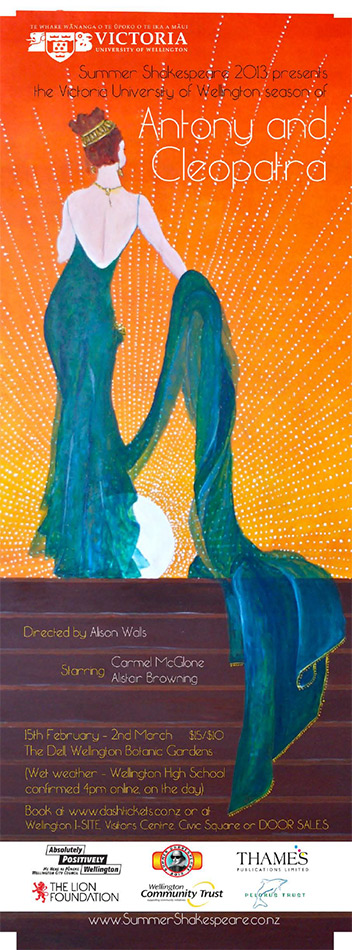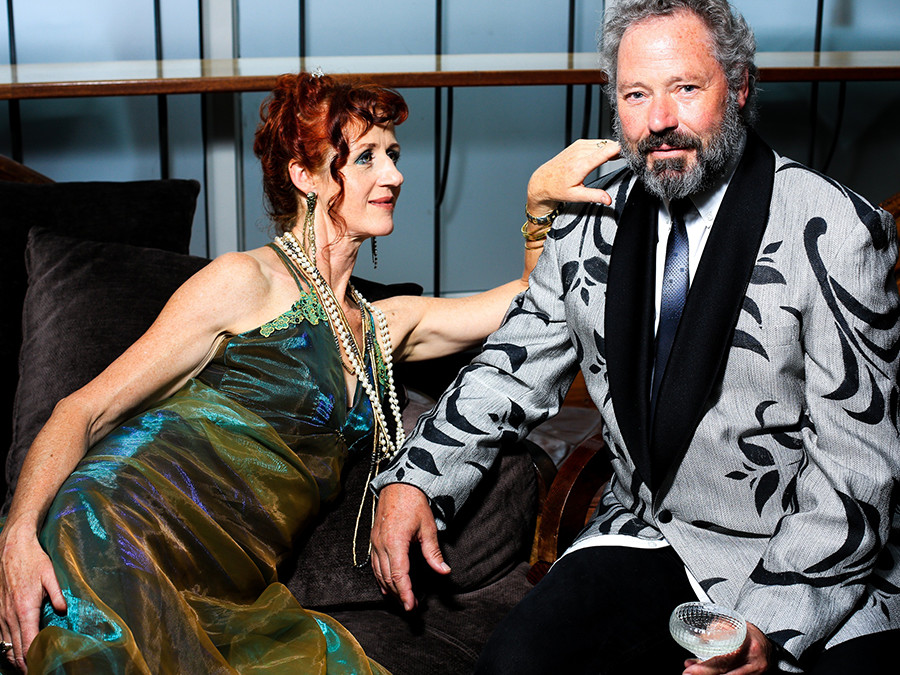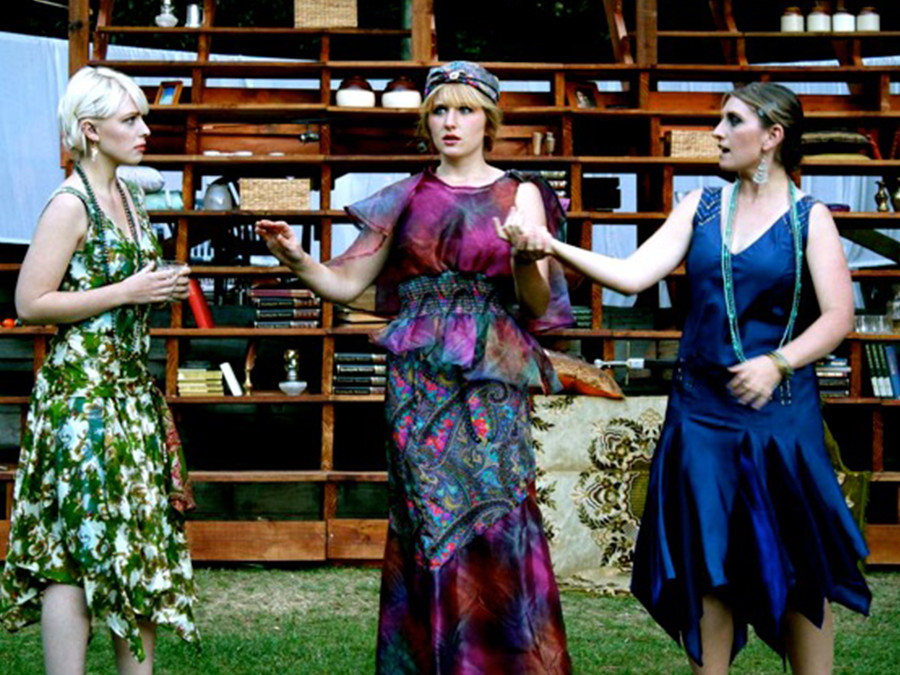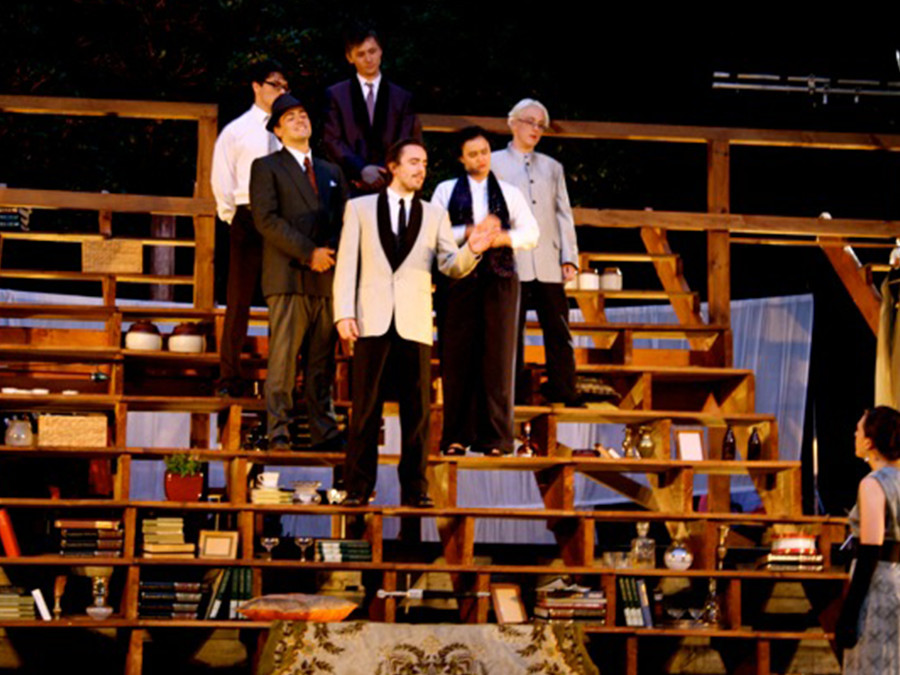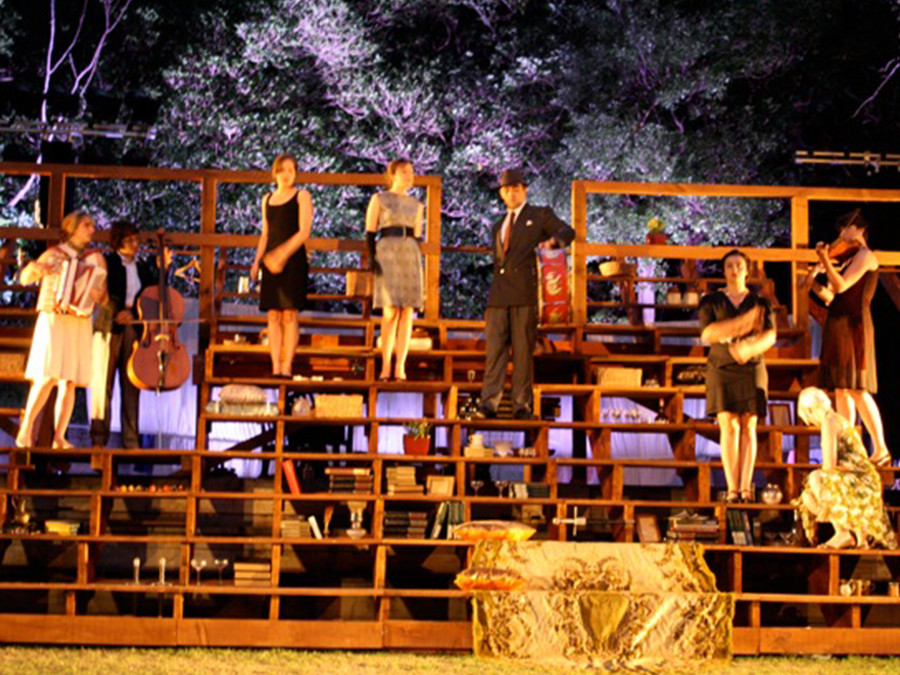2013 Antony and Cleopatra

- Production Information
- Cast
- Crew
- Image Gallery/Video
The Dell, Wellington Botanic Gardens
Friday 15 February - Saturday 2 March, 2013
Shakespeare’s primary source for Antony and Cleopatra was Sir Thomas North’s translation of Plutarch’s Lives of the Noble Grecians and Romans (1579). The play opens in 40BC, two years after the end of Julias Caesar and condenses a period of ten years into “the two-hours’ traffic of our stage” (or thereabouts)! The triumvirate formed between Mark Antony, Octavius Caesar, and Lepidus in the earlier play is now in a state of disintegration, in part because Antony cannot tear himself away from the enchanting Egyptian queen, Cleopatra.
Antony’s wife, Fulvia meanwhile has instigated a rebellion against Octavius Caesar before succumbing to sickness. These claims, along with the growing popularity of the rebellious Sextus Pompey—whose father Gneius Pompey supported Brutus in the assassination of Julius Caesar (Octavius’ great-uncle/adoptive father and Cleopatra’s former lover)—eventually draw Antony back to Rome. His relationship with Octavius is temporarily strengthened through Antony’s marriage to Octavius’ sister, Octavia.
This tenuous reconciliation does not last, however, and Octavius’ dissatisfaction with both Antony and Lepidus, whom he arrests for treason, sees the final dissolution of the triumvirate. Their opposition culminates in a sea battle near Actium, in which Antony shamefully follows Cleopatra’s fleet in their retreat. Antony’s supporters drop away, including his close comrade Domitius Enobarbus.
His shame and despair is brought to breaking point when Cleopatra falsely causes him to believe she has killed herself, and he commits suicide. Without her Antony and faced with the threat of being paraded as the triumphant Caesar’s captive, Cleopatra too commits suicide.
Director’s note
Probably Shakespeare’s 30th play (written when he was about forty-two), Antony and Cleopatra displays the poet working at his craft with a mature and daring sense of creativity. His mastery of language is ever-present, but in Antony and Cleopatra, Shakespeare plays—jazz-like—with the meter, to an extent not seen in his other texts.
The complexity and dynamism of the text reflects that of the characters. On one level a political play, it is ultimately the personal story that resonates most strongly. Like that other famous couple, Antony and Cleopatra’s love story is one that ends in suicide, but they are no Romeo and Juliet. Antony and Cleopatra are leaders, not children; they are both feared and admired; and they love, hurt, and delight each other with a full—if still troubling—knowledge of their own and each other’s flaws.
It is these recognisably human flaws that for me make this play so compelling. Shakespeare shows us the frailty beneath the glamour.
Perhaps every story is really about humankind’s persistent sense of the immortal and unavoidable awareness of their own mortality, a mortality thrown into relief by the idolisation, the mythologisation of people such as the famous general and his Egyptian queen. Antony and Cleopatra’s love for each other is an earthly passion, and although their tragedy reaches towards transcendence, in the end, we mortals—like the worm—will do our kind.
Antony Alistair Browning
Cleopatra Carmel McGlone
Caesar Andrew Goddard
Enobarbus Benjamin Haddock
Lepidus, Scarus, Proculeius David Lafferty
Pompey Gareth Ruck
Charmian Sharon King-Campbell
Iras Hannah Wilson
Alexas, Eros, Band Ania Upstill
Octavia Martine Gray
Soothsayer, Clown, Band Leader Emma Wollum
Agrippa, Demetrius Ruth Corkill
Mecaenas, Varrius Helen McIntosh
Menas, Dollabella, Band Chennoah Walford
Mardian, Soldier, Band Jessica Coppell
Messenger, Thidias, Taurus, Band Tom Kereama
Ventidius, Watchman, Seleucus Ben Richards
Canidius, Diomedes, Guard, Philo Jack O'Donnell
Menecrates, Messenger Shannon Friday
Ambassador, Pacorus, Band Zara Mansoor
Silius, Messenger, Decretas Brett Reid
Attendant Iris Henderson
Attendant, Servant Philippa Biggs
Watchman, Band Cordelia Black
Sentry, Watch Charlotte Pleasants
Director Alison Walls
Designer Theo Wijnsma
Costumes Marly Doyle
Lighting Designer Matthias Mard
Assistant Lighting Designer Rowan McShane
Producer Sally Thorburn
Production Manager Catherine Swallow
Publicity and Marketing Manager Sarah Leary
Stage Manager Julia Campbell
Assistant Stage Manager Ruth Love
Front of House Manager Beth Goodwin
Wardrobe Lisa Kiyamoto-Fink, Stephen Jackson, Poppy Sinclair-Lockhart
Make-Up Caroline MacLeod
Set Build Supervisor Les Meek
Set Builders Niell Hamilton, Jose Dulce, Achille Segard, Thomas Pepperell, Kim Bonnington
Film Documentarist Corey Le Vaillant
Fight Choreographer Peter Hassall
Musical Advisor Lucien Johnson
Props Maker Rose Kynoch
Lighting Operators Rebecca Sim, Jonathan Churton, Shreyasee Halder
Stage Crew Jessica Burkholt-Payne

